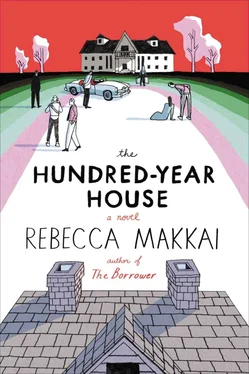The librarian led him to the glass-front cabinet and pulled out four books on local history. The only helpful one was the photo book of local estates he’d seen before, but he sat anyway in a computer chair staring again at the grainy photo dated 1929.
Designed in the English country style by Adler Ross in 1900 for the Devohrs of Toronto, Laurelfield was home to the Laurelfield Arts Colony from 1912 to 1954. Notable residents included the artists Charles Demuth, Grant Wood, and Emil Armin; composer Charles Ives; and poets Marianne Moore, Lola Ridge, and Edwin Parfitt. The home is now again a private residence.
These seven guests, while impressive, were the only seven he’d ever seen listed — and were, in other words, the only ones of note. Perhaps this was why there were no archives, no coffee table books of photographs and reminiscences.
The picture was taken from high up. It showed the north end of the big house, plus the space between the two buildings, filled by a massive, long-gone oak. Doug squinted at the windows, hoping to see lord knows what. Parfitt making out with Charles Demuth, maybe. There, in the bottom right corner, sat the coach house, two cars on the gravel drive in front, the ground floor still open to motor traffic. A man in knickers leaned against the eastern wall near the cars, his hand raised to his mouth. Smoking. By his feet, a blur of a dog. Doug knew the man wasn’t Parfitt, though he couldn’t say exactly why. The prosaic hat, perhaps, or some intangibly heterosexual angle to the hips, or the fact that here he stood by the cars when Parfitt would be upstairs on his bed, ankles crossed, gin in his left hand, black fountain pen in his right.
Doug had no idea when Parfitt was actually in residence at Laurelfield. He visited both Laurelfield and the MacDowell Colony in New Hampshire throughout the twenties and thirties, but the Parfitt archive at Princeton mentioned Laurelfield only once, in a letter from 1942: “I haven’t been as sick since one summer at Laurelfield,” he wrote to his niece, “and this time it’s worse because I’m getting old, Annette, I am.” When Doug had found that reference, he was already dating Zee, had already seen the Laurelfield Christmas card. He double-checked with her, as casually as he could (“Didn’t you say your house was an artists’ colony? At some point?”) and when Zee confirmed, it wasn’t that Doug saw her as a ticket to Laurelfield but that he took the connection for a sign. Here was this woman whose childhood bedroom might have been the very room in which Parfitt had written! The stars were aligned, and he should marry her. Zee, no Parfitt fan, was less impressed by the coincidence. “Lots of people stayed there,” she said. “He was probably in Grand Central Station at some point, too. That doesn’t make it hallowed ground.”
Doug xeroxed the picture and started home. It was blazing hot, the time of day when more reasonable nations took a siesta. He felt productive, for a moment, the xerox folded in his pocket, until it hit him that this was his way of “getting to work” on what should have been hard-nosed textual analysis: copying a picture of a house that he could see out his bedroom window anyway.
Halfway back, Case passed him running, on the opposite side of the street. Shining in the sun. Looking like he belonged in this town, in a way Doug never would.
Zee decided not to drink at the lunch.
The eight department members still in town were squeezed into the back room of Pasquali’s with spouses. Zee did not invite Doug to these events, preferring to talk him up in his absence. She’d created, over the past year, a mythical Doug whose earth-shattering book would soon be completed, whose thesis adviser wanted him to return to teach in Madison.
The celebration of Sid Cole’s twentieth year at the college (his thirty-fifth year teaching overall) had been put off for a few weeks by Sid’s gall bladder surgery. But now here he was, with his caterpillar eyebrows and obsessive lip-licking, as sprightly and malevolent as ever. Old age turns the most horrible people into “characters,” their misanthropy masquerading as crustiness. Sid was known to offer students a five-minute break in the middle of long afternoon classes, then mock anyone with the nerve to leave. The adoring faithful stayed and gleefully jotted “Coleisms” in their notebooks.
Cole was to blame, in Zee’s mind, for Doug’s joblessness. Two years ago, right after the college hired her, they offered Sid Cole’s job to Doug. Cole had announced his retirement, and Doug was the perfect fit. Then, the day before Doug was to meet with the dean and talk salary, twelve of Cole’s students showed up at the old man’s house with a bag of letters. They quoted Milton and Frost and Thoreau. They convinced him to stay. Zee’s contract was already signed, and Doug’s only other leads were on the east coast. Now, even if Cole retired, Doug — two years and zero publications later — was significantly less qualified for the job than he’d been back then.
Two things were necessary: a vaguely Doug-shaped hole, and a Doug who could account, impressively, for the past two years. The latter she had some control over; he’d finish the book this summer, even if she had to write the damn thing for him. The former was harder, but there were two small colleges in this town alone and a dozen more in Chicago, any one of which might become an option. It seemed even the adjuncts had sunk in their teeth, though, and weren’t budging.
And Cole announced, regularly, that now he was in for life. “They’ll have to carry me out on my desk chair,” he said, “exams clutched to my chest with rigor mortis.”
Zee sat between Ida Hayes and Jerry Keaton, grateful at least for her free pasta. Golda Blum, the acting chair, made a toast to “Sid’s illustrious decades of terrorizing students and baffling his colleagues.” It was an unspoken rule that to toast Cole was to roast him, and that he in turn would grunt and curse like the village drunk. Hoffman and Grasso stood to read a poem they’d written in a fit of Chianti-induced cleverness: “Old King Cole was a Derrida soul, and a Derrida soul was he — and he called for his Yeats and he called for his Poe and he called for his lady-friends three!”
Cole stood to give a brief speech about how he planned, in his twenty-first year at the college, to scare each and every student out of his classes, until he was left with “exactly one attractive and intelligent specimen that will grade its own papers and massage my neck.” When even Golda laughed, Zee pretended to as well. Cole must have felt his age protected him against rumors of impropriety, though Zee understood there were plenty of whispers about the man back in the eighties. She’d heard a senior boy claim he knew “for a fact” that the policy of leaving office doors cracked during student conferences could be traced to Cole’s misbehavior some fifteen years earlier. He had been married once, briefly, but by the time he came to campus he’d long been a swinging bachelor — attractive, back then, too — so rumors were bound to follow him. The fact that the rumors stuck , though, spoke to his behavior, not his erstwhile good looks. Jerry Keaton, for instance, with his kind eyes and soft voice and pictures of his toddler son all over his office, would never attract such talk.
Zee got through lunch by pretending it was Cole’s retirement party. And when that fantasy failed, she imagined relaying one of her own less amusing Cole anecdotes. She might tell about his sophomore advisee who came to Zee crying, after she’d shown Cole a course list including Stage Makeup for her double major in theater. “So you’re learning to put on makeup?” he’d asked. The girl had shrugged and said, “Basically.” He took her face in his hand, turned her head to the side, and said, “Well, it’s about damn time.” But even if Zee had worked up the nerve to tell this story, to say “Let’s raise a glass to the most insensitive man in Illinois,” the others would have chuckled, waiting with bated breath for the old man’s reply.
Читать дальше












